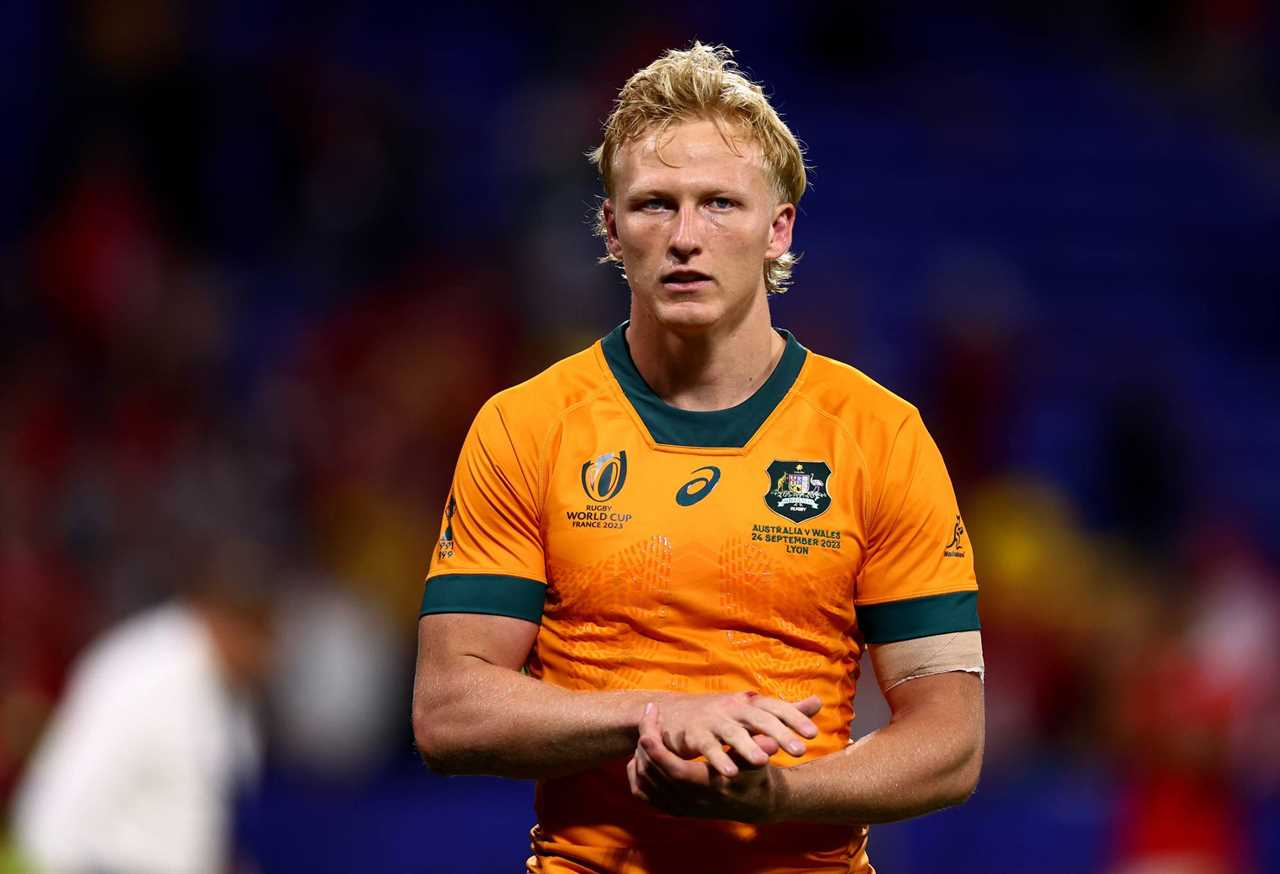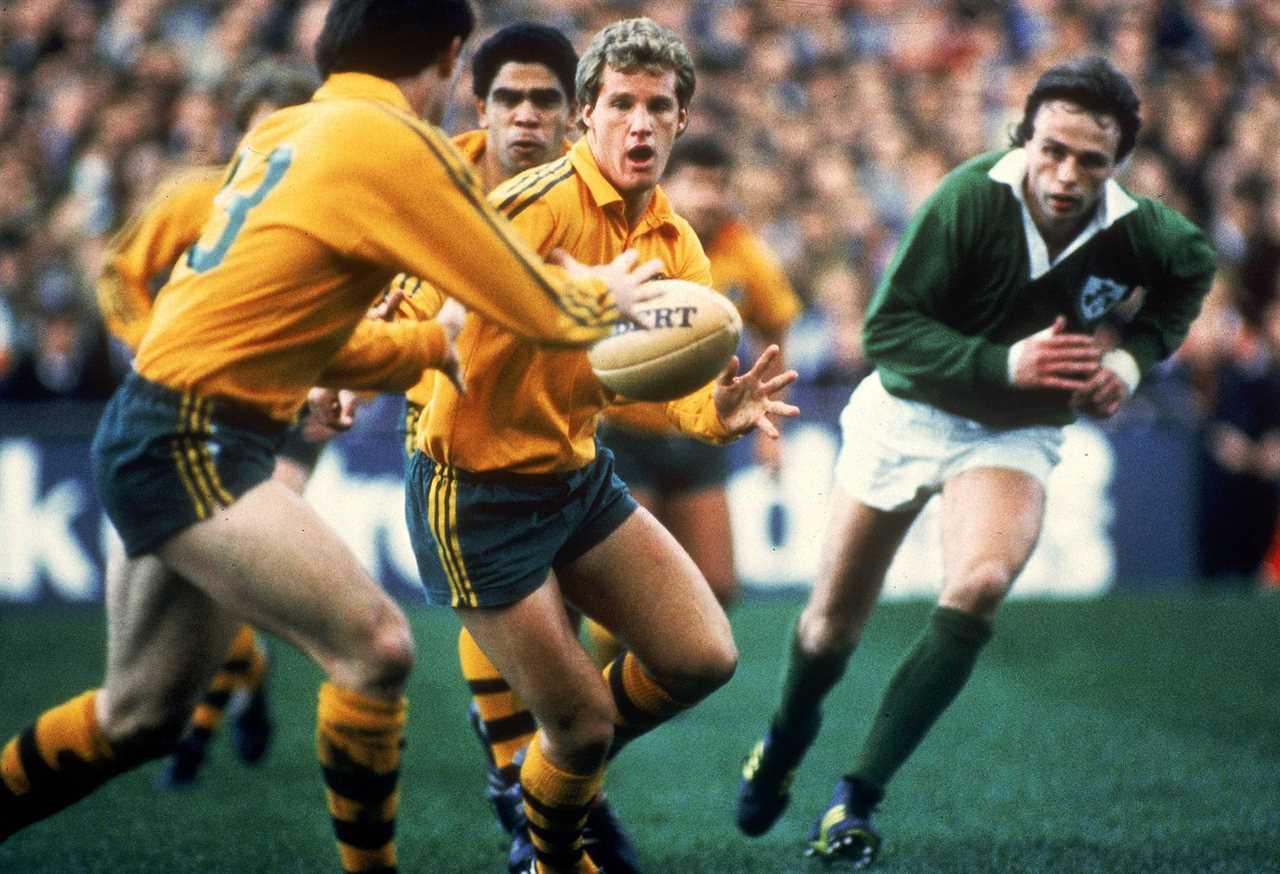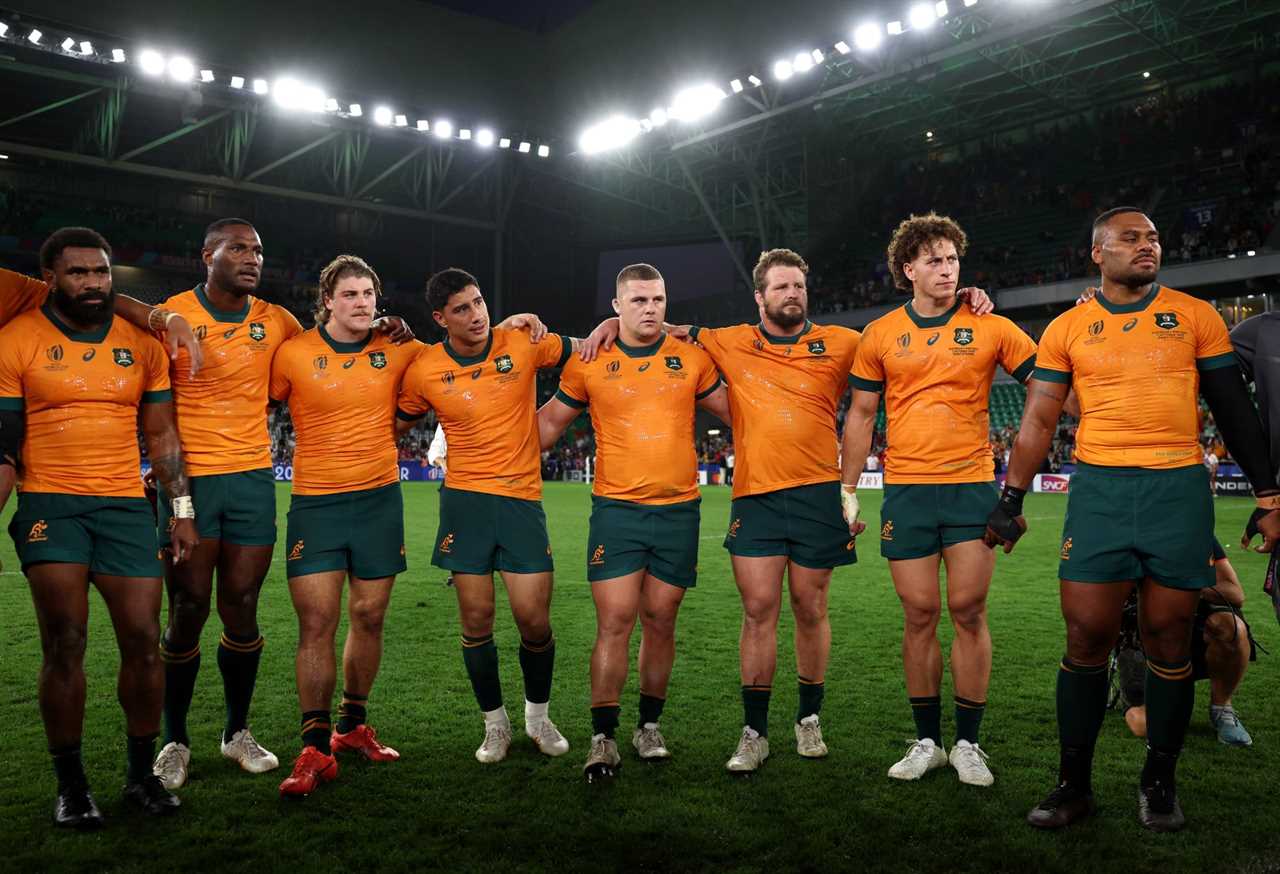Australian rugby’s journey from world’s best to laughing stock has continued with a first-ever pool stage elimination at the World Cup, and one of our greatest-ever talents fears the worst might be yet to come.
World Cup winner Michael Lynagh has outlined a doomsday scenario in an interview with Matt Dawson for the BBC Rugby Daily podcast, during which he bemoaned the current Wallabies’ lack of leadership in France, and suggested some of the players might not recover from the experience.
He added there was “a real possibility of Australian rugby disappearing down a big sinkhole.”
While Lyngah didn’t mention coach Eddie Jones during the lengthy chat, he said he did not blame the players for the humbling exit.
“My overriding emotion is one of sadness,” said Lynagh.
“Australia really haven’t fired a shot at this World Cup and it’s really disappointing. I feel for the players. They’re not bad players and they’ve worked really hard but when they get out on the field it just doesn’t seem to click for them.
“I feel the way this has gone there’s going to be a few of them that might struggle to get over this experience. I hope not.
“So sadness, not just for the players but a lot of Australian supporters, not only the ones back home but also the ones that have financially and emotionally supported the team in France. To be knocked out so early is terribly disappointing for them all.”
Lynagh gave credit to Fiji and Wales, who have emerged from the group with Australia in third having beaten just Georgia and Portugal, but the lack of leadership surprised the former star No.10.
Jones opted against experience in the playmaking role and this week admitted his first choice, Carter Gordon, had been disappointed by his performance.

(Photo by Chris Hyde/Getty Images)
Jones also shuffled skippers throughout his nine Tests this year – Dave Porecki ended up with the most in the role in 2023 with three.
“I always tried to be the swan, you look nice and elegant, deep down you’re paddling pretty hard,” said Lynagh, who played in the first three World Cup tournaments, winning it in 1991.
“That’s where I always used to think if young guys like Timmy [Horan] and Jason [Little] in the 91 World Cup, or even more mature guys, saw me panicking, that’s not good for the team.
“You go, ‘ok, I’ve got to be the one here that does this. If they look to me I’ll do it and I’ll take it’.
“In decision-making positions that’s very much the responsibility you take on and when it gets tough people look to you.
“I’m not blaming the players but Australia, say against Wales or Fiji, you look through the team – where’s the experienced person the rest of the team look to? When you’re standing under the posts, Fji have just scored you’ve gone behind and there’s 15 to go, who’s doing the talking? Who’s the one saying ‘here’s what we’re going to do, we’ve trained for this’? I just didn’t see it.”
He said the players underperformed in comparison to their abilities.
“These guys who got picked, I see them every week and we know they’re good,” said Lynagh.
“I think in the representative arena, when they go into that, there’s almost a fear of failure, or fear that ‘I don’t want to make a mistake because if I make a mistake I could get dropped. I want to play for Australia but also I want to be here. Is there a reticence around really having a go and making a mistake?”
Dawson suggested Australian rugby was known in the past for its running rugby DNA, but that has now gone the way of the Concord Oval goalposts.
“That was the way going back to when I first started. We didn’t have a great forward pack but if we got 50 percent of possession and territory we’d probably win the game because we seemed to be a lot more athletic, a little smarter with the way we used the ball,” said Lynagh.

Michael Lynagh of Australia in action during a Rugby Union match between Ireland and Australia held in Ireland, United Kingdom. (Photo by Getty Images)
“It didn’t seem to exist this time around. It’s probably the culmination of a downward trend over the past 10 or 15 years that [Australian] rugby’s been heading this way and this was a full stop, wake-up call that something has to be done in Australia about this and the decline of rugby.”
He said young players with sporting prowess were choosing other codes more and more while arguing that the pro ranks can’t sustain five Super Rugby teams.
“We all hope that a successful Australian rugby team can carry us through and plaster over these problems but I’m afraid this time it hasn’t,” said Lynagh.
“It’s very important for Australia to be competitive, not only from a global point of view but from an Australian point of view. If you’re not selling out stadiums for a Lions tour and there’s not commercial interest from TV, that’s real trouble for Australia rugby.
“We want them to be competitive we want to have the local support behind us, the whole country behind us, as opposed to AFL and rugby league supporters laughing at us and putting us down – which is what is happening at the moment.”
Lynagh said he had feared the worst for the Australian game for some time.
“It’s at pretty much a low point at the moment but a lot of people – me in particular – have seen it coming for a while and been worried about if for a while,” Lynagh said.
“There’s talent there, at schoolboy level. Go back a little bit, and I’m not a big one ”for in my day we did this” but the traditional pathway of an Australian rugby player was talent was identified at school and there weren’t that many schools playing so you could identify talent.
“It was nurtured very well through that 15-year age group through to under 18s, schoolboys, under 21s and it was looked after. Then you’d go to a club, your state and then Australian rugby.

SAINT-ETIENNE, FRANCE – OCTOBER 01: The players of Australia form a huddle at full-time following the Rugby World Cup France 2023 match between Australia and Portugal at Stade Geoffroy-Guichard on October 01, 2023 in Saint-Etienne, France. (Photo by Chris Hyde/Getty Images)
“We seem to have lost that ability to connect juniors with clubs and states and juniors seem to disappear – they either go to league or lose interest in union and go to do other things, Aussie Rules and football as well now.
“There seems to be a disconnect and until we reconnect that and try and get that pathway reconnected I think we’ll still struggle to have people coming through.”
Lynagh believes Australia’s earlier success at World Cup level came because the Test team was made up of players from two states, or an even smaller circle of “Sydney and Brisbane, basically.”
“Leinster play together a lot, they know each other really well, they gel together and we seem to have lost that a little bit now with having five teams in Super Rugby and competing against NZ and South Africa when they were in the competition.
“It’s tough and we’re not winning a lot against those teams. Having five teams has really disappeared the playing togetherness. We just don’t have the playing population to fill these teams.
“Maybe there’s going to be some tough decisions having to come up as to how we structure the situation in Australia and I’m afraid the results at this World Cup have shown the current system hasn’t been working for a while and it’s going to take some time for any changes to come to fruition.
“Something has to happen, we can’t continue this downward spiral.”
Lynagh pointed to centralisation – a hot topic in the past few weeks – as a worthy plan.
“We can look at the Irish and New Zealand systems where there are a lot of centrally-contracted players and the point of the pyramid is ultimately the Ireland team where all the provinces and schoolboy stuff is aimed at. Same as NZ.
“In Australia, we have a federated system and states are their own little fiefdoms and they don’t like each other and don’t trust Rugby Australia.
“There’s got to be a change in how we’re doing those things. They are big, bold decisions that will not be popular, but if we don’t there will be real problems in going the same way we’re going.
“The other thing is you need money to do this and money is an issue.
“With the performance at the current World Cup with another television contract to be negotiated soon, the values are dropping. It’s a downward spiral.
“You’re looking at Aussie Rules and rugby league, they’re billion-dollar TV contracts, ours is $30 million or something.
“That’s what we’re competing with in Australia. Aussie rules and rugby league can afford to go into all the schools, rugby union traditional schools, find the best talent and take it. It’s a big issue and a big problem. There’s hopefully smarter people than me making decisions going forward.
“They’re not going to be popular but unless we do them, there’s a real possibility of Australian rugby disappearing down a big sinkhole.”
https://www.theroar.com.au/2023/10/09/laughing-at-us-wallabies-legend-fears-doomsday-scenario-for-australian-rugby-urges-bold-solution/
 Backyard GrillingWeekend WarriorsAdvice from DadBeard GroomingTV Shows for Guys4x4 Off-Road CarsMens FashionSports NewsAncient Archeology World NewsPrivacy PolicyTerms And Conditions
Backyard GrillingWeekend WarriorsAdvice from DadBeard GroomingTV Shows for Guys4x4 Off-Road CarsMens FashionSports NewsAncient Archeology World NewsPrivacy PolicyTerms And Conditions
